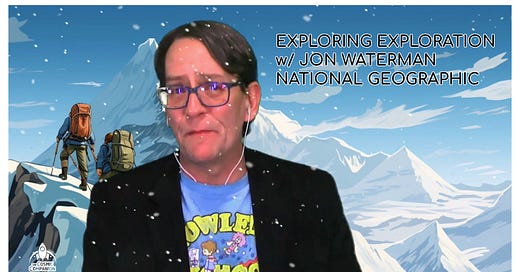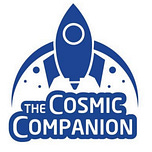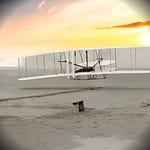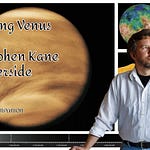Hello everyone!
This week on The Cosmic Companion, we explore exploration, exploring the human need to… explore. Later in the show, we’ll be talking with Jon Waterman, creator of Atlas of Wild America from National Geographic.
From the dawn of time, humans have been driven by a primal urge: the need to explore. This innate curiosity has shaped our history, propelling us from the confines of caves to the vast expanse of our planet, and beyond.
Let’s take a detour down memory lane. Somewhere between 75,000 and 50,000 years ago, a group of mobile Homo sapiens decided to take humankind’s first road trip out of Africa. Even without roads. Talk about wanderlust! This migration wasn’t just a change of scenery — it resulted in a monumental shift for our species, shaping human evolution.
Jon Waterman appears on The Cosmic Companion 4 November 2023. Creative Commons 4.0 Attribution 2023 The Cosmic Companion.
And who could forget the Ancient Greeks and Phoenicians? They were among the original sea-faring explorers, navigating the Mediterranean long before GPS and Google Maps.
Wait. [HOLD EARBUD] I’m getting a notification that we have a surprise guest on the show this week. Yes, (is this real? are you sure, Max? Wow. Ok.) Everyone, in a special chronophone interview from 330 BCE, please welcome famed navigator, astronomer, and all-around curious fellow, Pytheas.
—
χαίρετε! Name’s Pytheas. I’m just your average merchant from Massilia… what? Oh, it’s somewhere in what you would call the Provence region of southern France.
Anyway, I’ve always had this thing for stories. The wilder, the better. [FULL OPEN] More than 23 centuries before your time, I heard tales of mythical lands, strange creatures, and seas that stretch beyond the horizon. Most folks just dismissed them as sailor’s yarns. No, no. That’s a thing. You’d be surprised how many sailors enjoy macrame…
But me? Hearing these stories, I thought, “Why not go check out these legends for myself?” So, I packed my bags and set sail.
Now, let me tell you, sailing the Mediterranean is a piece of honey cake. But the Atlantic? That’s a whole different kettle of fish. Literally. The fish are different. Heh heh. Fish…
Anyway, there I was, circumnavigating the land you call Britain, or as it went by in its youth, Britannia. I always had a knack for astronomy, and I even figured out the North Star isn’t exactly north. Also, I realized that the Moon plays a role in tides. Good to know when you’re spending months or years at sea.
But I wasn’t on the boat all the time. I also got to walk around parts of Britannia, including the legendary tin mines of Cornwall. The people there call themselves the Briton Celtics. I didn’t even know they played basketball.
But, up north, the real highlight was the midnight sun. Imagine this: it’s the middle of the night, but the sun is still shining brightly. Great for getting more science done, if not for sleeping outdoors.
So there you have it. I’m just a regular guy on an extraordinary journey. Not only did I prove legends of northern Europe true, but I also wound up with a good story or two to tell.
Any idea where I can hitch a ride on a rocket?
—
Maritime voyages of Ancient Greeks and Phoenicians not only expanded their trade routes but also led to advancements in astronomy, geography, and navigation. Talk about making waves!
Then there was Marco Polo, the original globetrotter. [ARE WE TALKING BASKETBALL AGAIN?] His travels to Asia were like the ultimate vacation slideshow, except instead of awkward family photos, he brought back tales of exotic lands and cultures that blew everyone’s medieval minds.
[MARCO POLO: Dude. I LITERALLY hung out with Kublai Kahn in Xanadu. No way you’re going to top that!]
And let’s not forget about those brave souls who dared to explore the icy wilderness of Antarctica and the towering heights of Mt. Everest. These explorers faced harsh conditions and extreme dangers, but their spirit of adventure and discovery pushed them forward.
Their journeys expanded our understanding of these remote places, while testing the limits of human endurance.
Fortunately for us all, not all exploration is that strenuous, or hazardous.
Next up on The Cosmic Companion, we welcome Jon Waterman from National Geographic to the show. We’ll be discussing the human drive to explore, and his new Atlas of Wild America.
Fast forward to the 20th century, and our thirst for exploration led us to the final frontier: space. The Apollo missions were like an interplanetary camping trip — with fewer s’mores and more moon dust. When Neil Armstrong set foot on the moon in 1969, it was a giant leap not just for mankind, but for our collective spirit of discovery.
As we look to the future in the 21st Century, the spirit of exploration continues to thrive. With advancements in technology, we’re not just exploring physical spaces but also virtual ones. The rise of virtual and augmented reality technologies, together with artificial intelligence, has opened up new frontiers for exploration, allowing us to experience places and ideas in ways previously unimaginable.
As we stand on the precipice of a new era in space exploration — with missions to Mars and beyond on the horizon — we are reminded that exploration is not just about reaching new frontiers but also about pushing our limits and striving for a better understanding of our place in the universe.
As we explore the depths of our oceans, the vastness of space, and virtual worlds — we carry with us this indomitable spirit of curiosity. Our future may lie in the words of J.R.R. Tolkien, who said, “Not all those who wander are lost.”
So go ahead, pack your bags (don’t forget your towel!) [TOWEL], and let’s set off on our next adventure, becoming a better, wiser, species than we were before we took our first steps away from the familiar. Because at its core, that’s what exploration is all about.
The Cosmic Companion is starting the first half of our winter break, taking three weeks off. After all the dumb jokes and crazy costumes this year, we need it!
We will come back on 2 December, getting The Inside Story on Planets, talking with physicist Sabine Stanley from Johns Hopkins University. We’ll be discussing her new book, What’s Hidden Inside Planets? Make sure to join us then.
If you enjoyed this episode of The Cosmic Companion, please download, follow, share, send large sums of money to us, like, and comment on our show.
Have a great Thanksgiving and we will see you all on 2 December. Bring a plus one.
Clear skies!
James
COLD OPEN:
Oh, great. 21st-Century Earth. Smells like… [sniff-sniff] humans.
[“Wow, a real-life space chimp!”]
Yes, yes, marvel at the space chimp. I’m not here for your amusement, you know!
[‘I gotta get a selfie with you!’]
What is this with you humans and your social media?
[CARS WHIZZ BY]
This must be what they call a “rat race.” I know rats, and they would never create this sort of society. It’s like humans are in a never-ending hurry to… well, I’m not quite sure why they’re in a hurry.
[Are you here to take over?]
Take over? Why would I want to take over this mess? This world would be a much better place if everyone just watched The Cosmic Companion, you know!
[What are your future plans?]
If I ever get back to my own time, I’m going to become a sci-fi filmmaker. I’ll create a film called Planet of the Humans…
Action!













Share this post